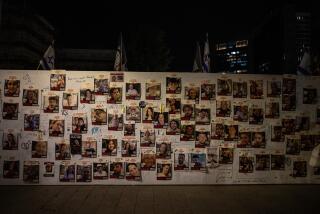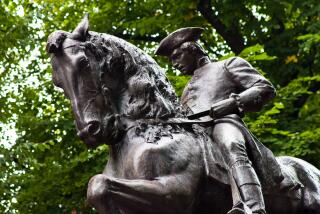Anti-Terrorism But Pro-Human Rights
- Share via
In January, Judge Audrey B. Collins of the federal district court in Los Angeles ruled against a key provision of the 342-page Uniting and Strengthening America by Providing Appropriate Tools Required to Intercept and Obstruct Terrorism Act of 2001, better known as the USA Patriot Act, drafted by the Justice Department and ratified by Congress following Sept. 11. Arguing the case against the government was Georgetown University law professor David Cole, a human rights lawyer and pro bono co-counsel. The author of “Terrorism and the Constitution,” “No Equal Justice,” the recent “Enemy Aliens” and numerous opinion pieces for The Times spoke with us from his Washington, D.C., office.
Only part of the Patriot Act was involved in the recent court ruling. Which?
One of the most extreme provisions, because it penalizes speech. It makes it a crime to provide advice, if you are an expert, to any group labeled “terrorist” by the secretary of State, without regard to the nature of your advice.
How did the provision affect your client?
The Humanitarian Law Project is an L.A.-based international human rights organization. Ralph Fertig, the president of the Law Project, teaches at USC now, but was for years a federal administrative law judge. He has been a human rights activist for over 50 years. The Law Project had been working with the Kurdistan Workers Party, which represents the Kurds, a group targeted by virtually every country in which they are found. The Law Project sought to encourage the Kurdistan Workers Party to resolve those grievances through peaceful means. Once the secretary of State designated this group as a terrorist organization, it became a crime for the Humanitarian Law Project and its members to provide human rights advice, to seek to discourage violence. That’s precisely what we maintained rendered it unconstitutional. We went to court to seek a ruling that it is our client’s right to provide this kind of support as long as they are not supporting illegal activities. We got everything we asked for. I’m certain it will be appealed.
During the 1980s, you stopped the deportation of the L.A. 8, noncitizens who supported Palestinian causes. They now are facing deportation again under retroactive Patriot Act provisions. Didn’t the L.A. 8 support the terrorist Popular Front for the Liberation of Palestine?
The Popular Front for the Liberation of Palestine has certainly engaged in terrorist activity in the past. But my clients, who the government has conceded never engaged in any criminal activity, much less terrorist activity, are charged with supporting the PFLP in political ways during the 1980s, when it was perfectly legal to do so, by distributing magazines, organizing demonstrations and dinners and the like. This is another example of how far the Patriot Act goes. The government now wants to deport them under a law passed in 2001 for distributing magazines that were legal to distribute in the mid-1980s.
Do we need antiterrorism laws?
Absolutely. Sept. 11 was a wake-up call. We were under the illusion that other human beings would not stoop to the depths Al Qaeda did on 9/11. We do need to think seriously about appropriate measures. My concern is that we do it in a tailored way and fair way.
You often defend foreign nationals and lawful permanent residents. Why should they have the same protections as American citizens?
There’s a principled reason and a pragmatic reason. The principled reason is that the Bill of Rights [addresses] human beings, not citizens. The Constitution does limit some rights, like the right to vote, to citizens, but the rights to speech and association, due process, equal protection and privacy are not limited to citizens. And that reflects a fundamental understanding that they were God-given, and God didn’t give them just to people with U.S. passports. The pragmatic reason is that the next thing you know, they’ll be seeking to extend the same tactics to U.S. citizens. One of the things the Patriot Act and other measures do is give the government a huge amount of discretion to target those it suspects but lacks hard evidence on. That kind of power can be used for legitimate purposes, to go after the Al Capones of this world, and it can be used for illegitimate purposes, to go after the Martin Luther Kings of this world. And history shows that it’s been used against both.
How would you respond to those who question your patriotism and your choice of clients?
To be patriotic is to defend the best that the country can be. And the best that this country can be is reflected in the tradition of constitutional rights and civil liberties that we have. But unless people are willing to stand up and defend those liberties in times of crisis, we won’t have them.
More to Read
Sign up for Essential California
The most important California stories and recommendations in your inbox every morning.
You may occasionally receive promotional content from the Los Angeles Times.










